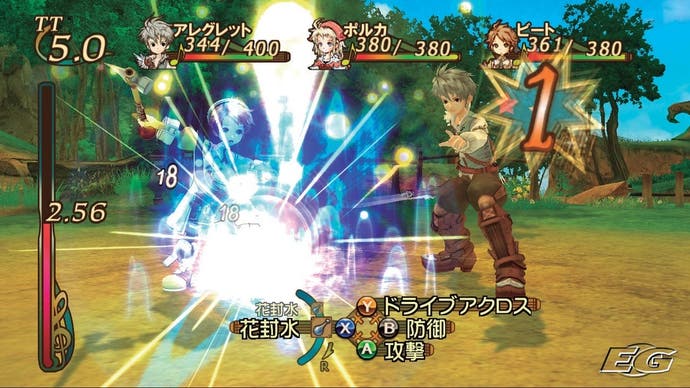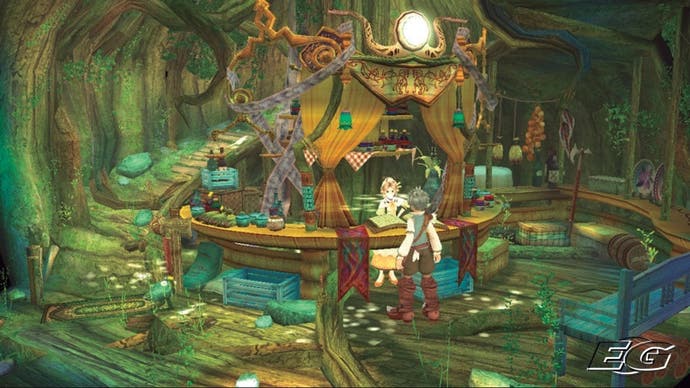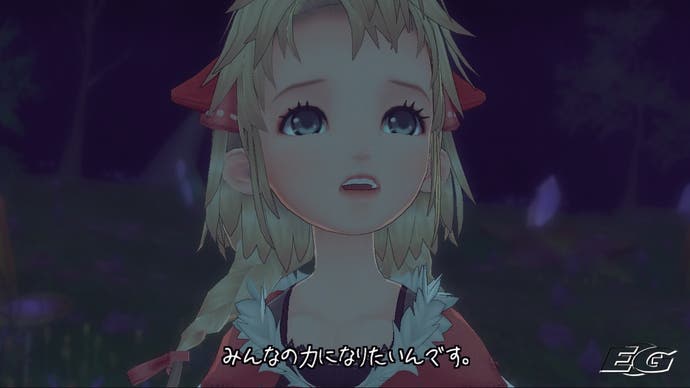Eternal Sonata
TGS: The game also known as Trusty Bell.
Last generation was easy. If you wanted to play Japanese RPGs, you bought a PlayStation 2 - preferably investing in a dirt-cheap GameCube later on in the cycle when the likes of Tales of Symphonia tempted you to the platform. Microsoft's failure to crack Japan meant that this entire genre of gaming remained largely untouched on the Xbox, and the opinion-polarising properties of JRPG styling and gameplay meant that the majority of Xbox owners were perfectly happy with that situation.
Next generation won't be so easy. Change has been on the wind since before the Xbox 360 appeared, with legendary names in the JRPG field like Hironobu Sakaguchi signing up to produce titles for Microsoft Game Studios - and now there's a strong upswell in third party support for the console in Japan as well. Whether it's the lure of Bill's Billions or a genuine belief in the potential of the platform that lies behind it, Microsoft is no longer the little boy that Japanese developers forgot - and nowhere was that more obvious than at TGS last weekend, where the firm's line-up of locally developed software actually gave the PS3 a serious run for its money.
Lost Oddysey and Blue Dragon are the headline titles for Microsoft in Japan, of course, but it would be wrong to assume that they're stand-alone RPGs on a platform otherwise bereft of turn-based goodness. Also on display at TGS, in a lengthy playable demo which occupied an entire row of machines, was the latest RPG from developer Tri-Crescendo - creators of quirky but eminently likeable GameCube title Baten Kaitos. Called Trusty Bell: Chopin's Dream in Japan, and due for a 2006 launch there, we'll be seeing it in the west in 2007 under the somewhat less snigger-worthy title Eternal Sonata.
A little background, first. The game is, as the name suggests quite heavily focused on music - specifically, the music of Polish pianist and composer Frederic Chopin. The slightly absurd conceit of the title is that three hours before he died (in 1849, at the relatively young age of 39, from tuberculosis, morbid fact-fans), a delirious Chopin entered into a dream world, and there met a young girl called Polka, who also has an incurable illness, along with her companions - who wield magical powers all based around a musical theme. Contributing to the musical focus of the game, the score will be composed by the always-superb Motoi Sakuraba, whom fans will recognise from the Tales of... series, the Star Ocean series, Valkyrie Profile and, of course, Baten Kaitos, while Russian pianist Stanislav Bunin will be performing the Chopin pieces for the game.

Unfortunately, much of this aspect of Eternal Sonata was lost on us at TGS, for the simple reason that the show is really very noisy - which meant that while we could play the game perfectly well, actually hearing it was quite tricky. Even hearing the voices (essential when, like me, you're a lazy type who has learned to understand spoken Japanese but never managed to get to grips with the written language) was a bit of a strain, so Chopin's delicate melodies were rather lost in the melee; however, we're assured that they play a very key role in the game, although how exactly that works is something we just don't know right now.
The section of the game which we played is fairly straightforward, and sees the player running through a series of very lovely countryside environments, battling occasional enemies, and chatting to a few NPCs in a small village that you run across. There's not a lot of variety here, but it's certainly enough to get a strong feeling for how the game looks, feels and plays - and on all of those counts, it certainly seems that Tri-Crescendo have outdone themselves, producing a lovingly crafted game with a strong artistic sense and a stylish and unique battle system.
Graphically, Eternal Sonata is far from the most technically accomplished game on the Xbox 360, but like many Japanese titles, its strength lies in its art rather than in the programming accomplishments underlying the game. Characters and environments are beautiful, detailed and most of all, colourful; the game, heavily influenced by the same kind of manga styling which can be seen in titles like Final Fantasy: Crystal Chronicle and, indeed, in Baten Kaitos, uses the full palette of colours to great effect. Unlike many games, especially on the Xbox 360, it's happy to create cheerful natural environments, and the demo we played featured forests, meadows and village areas which were relentlessly upbeat and incredibly pretty in a homely, pastoral sort of way.

As with most JRPG titles, gameplay on the field is simple - you walk through the various environments, taking occasional side trips to find chests and so on, but primarily just progressing towards your next destination. Where things get interesting is when you run into a monster on the world map - yes, that's right folks, this developer is a fully signed up member of our crusade to see an end brought to the curse of random battles - and you transition, absolutely seamlessly and incredibly quickly, I might add, into the battle system.
For this demo, we had three characters in our party, which seems to be the maximum number available to you. Like many modern RPGs, this game is one where your position on the map is relevant to the actions you and your enemies can make - but unlike most RPGs, Eternal Sonata combines real-time and turn-based combat in a completely unique way. Each character on the field has a chance to move and attack in turn - but while it's their turn, everything happens in real-time, with four or five seconds in which to execute whatever commands it is you want to carry out. In essence, this works by giving you direct control of a character (you can always tell which character, or enemy for that matter, will have the next slice of time by looking for the "Next Up" label above their heads), letting you run around and unleash a variety of melee or magic attacks, and then wresting control from you once more when the timer runs out and moving on to the next character.
It's an interesting mechanic, because it forces the player to take into account the length of time that each of his attacks or spells will take to execute. While the game does adopt a Magnus Magnusson "I've started so I'll finish" approach to the various moves - so you'll never find one abruptly cut off when the timer runs out - it's still important to work out what you're doing from this standpoint, because firing off a lengthy attack at the start of your movement period will eat into your time seriously, while doing it at the end means you'll take advantage of the game mechanics to finish the move in "free" time after the end of your time slice. It's a system which is incredibly easy to use, but which we suspect is very complex to master - and the potential for timing-based tactics was only really becoming clear to us by the time the demo ended. It's the sign of a good game that a few hours later on a train back in to Akasaka, we were still having ideas for things we'd like to try with the battle system.

Within the framework of that system, the game tends to stick largely to RPG convention - you have a central character with strong melee attacks, another young chap (at least, we think he's a chap - the character designs are very pretty but definitely err on the androgynous side) with ranged weapon attacks, and a girl who has magical abilities and healing spells. All of these attacks depend heavily on positioning - so for example, to heal someone you need to be quite near them, and various other spells have an area-of-effect nature, as do many enemy attacks. This leads to an interesting trade-off - if you bunch your characters up, it's easier to heal them but also easier to hit them - and we expect that similar trade-offs will be in the balance as the game becomes more difficult and strategy becomes more important.
Walking away from Eternal Sonata, there was a feeling that - more so with this than with any other game at the show - we had only scratched the surface of what the final product will offer. The use of music in the game remains something of a mystery to us, but with the works of Chopin forming a key part of the title's proposition, and the involvement of a composer of Sakuraba's calibre, we'll be intrigued to see how that shapes up; while the combat system itself has plenty to offer and looks like making this into one of those rare RPGs where you can happily fiddle with your strategy for ages to work out exactly how to utilise your characters and their abilities to the best effect.
Most of all, however, Eternal Sonata looks like a Japanese RPG which would be fantastic regardless of what platform it appears on, which is both surprising and welcome on the Xbox 360. Cheerful, colourful and beautiful, it belies the reputation of the system for being a platform devoted to military sims and marines-killing-aliens testosterone-fests, and suggests that Microsoft is finally managing to expand its software portfolio beyond the teenage boys with anger management problems market which the original Xbox had firmly in its sights. At TGS, Japanese consumers didn't seem convinced, and flocked to the PS3 stand in their droves, leaving the Xbox 360 area looking comparatively quiet (albeit still very busy) - but whether Japanese consumers get it or not, western audiences hungry for Japanese style content almost certainly will. The Xbox 360, unlike its predecessor, looks more and more like a must-purchase for JRPG fans with each passing day, and Eternal Sonata is shaping up to be one of the best reasons yet to add it to the shopping list.


